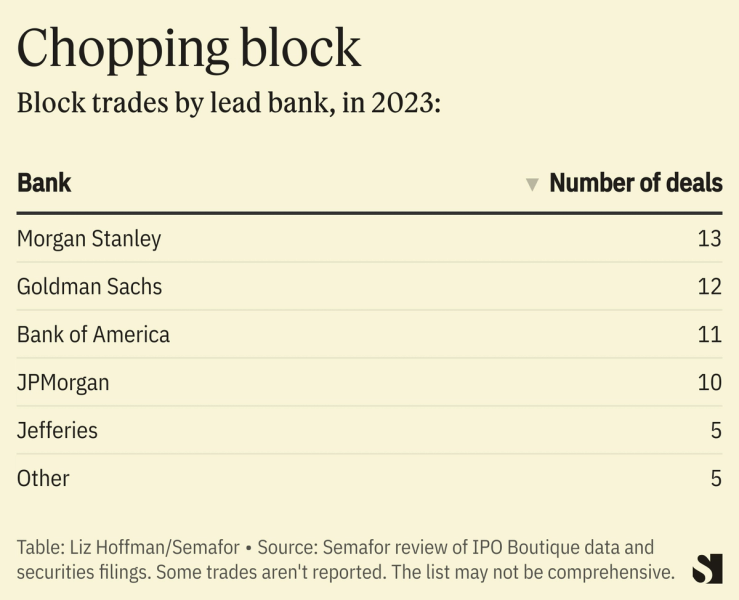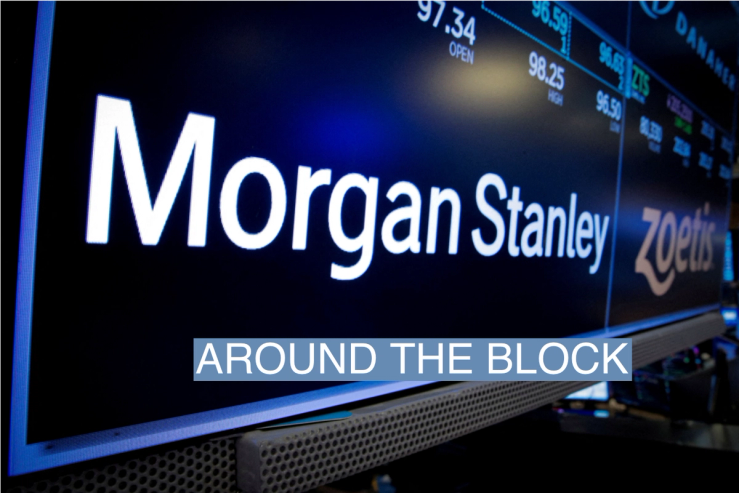The Scoop
Morgan Stanley may pay as much as $1 billion and promise to tighten its internal controls to resolve a long-running U.S. probe into how it handled private stock sales.
Authorities have spent more than four years investigating whether Morgan Stanley improperly tipped off favored hedge-fund clients to big blocks of stock coming on the market. The bank fired several employees and pulled back from the block trading business, losing market share to rivals.
A possible settlement with Justice Department and Securities and Exchange Commission would involve a fine of between $500 million and $1 billion, people familiar with the matter said. Morgan Stanley would also admit that it didn’t properly oversee its employees and commit to specific compliance changes, but likely wouldn’t have to plead guilty to a crime, avoiding a major black mark on a record that’s been cleaner than rivals’.
The government may yet push for a non-prosecution agreement, in which Morgan Stanley would publicly admit its failings but not face charges, so long as it doesn’t violate the terms of the pact. No individuals are expected to be criminally charged, some of the people said.
The terms haven’t been finalized and could still change. The two sides haven’t yet discussed a specific penalty amount in detail, and Morgan Stanley won’t estimate the cost in its quarterly earnings filing with the SEC this week, one of the people said.
The talks come as Ted Pick, who ran the block-trading business for years, prepares to take over from James Gorman on Jan. 1. An investigation that traveled up the ranks rather than down to now-dismissed subordinates, or a criminal indictment of the firm for things that happened on his watch, would have complicated his promotion.
He was never interviewed by authorities, a person familiar with the matter said, and the board concluded he was unlikely to be tarred by any settlement.
Representatives for Morgan Stanley, the DOJ, and the SEC declined to comment.
In this article:
Know More
For years, investors noticed that stocks would fall just before a major investor sold out, almost as if the market knew the trade was coming. (A big stock sale pushes the price down.) It happened far more often when Morgan Stanley was leading the deal.
In one case, a client all but accused the firm of leaking. The stock in question, Palantir, “got destroyed at the end [of the day] … not a great look,” the client texted his banker, according to a later filing in a subsequent arbitration.
Liz’s view
Morgan Stanley was the leader in block trading but pulled back while the government investigated, to the benefit of rivals. Its market share has fallen from about half between 2018 and 2021 to about 20% this year, according to a review of securities filings. The big winners appear to be JPMorgan and Bank of America.
Even if it regains its appetite, it will need time to rebuild the group after firings connected to the probe.
But Pick needs to reassure Morgan Stanley’s bankers and traders that the firm, which Gorman steered toward Main Street offerings, still values what they do. Block-trading sits at the intersection of stock trading and stock underwriting — two of Morgan Stanley’s strengths — and feeds both. A commitment to that business will send a message that Morgan Stanley hasn’t lost its Wall Street DNA.

More interesting to me is whether this permanently cools block-trading. It’s always been a murky business, one with obvious incentives to cross lines but also plenty of legitimate gray areas.
To fine-tune their bid, traders need to know what they can flip the shares for. They get paid a lot of money to know what the market is willing to pay for a particular stock on a particular day. But there are a lot of stocks, and sometimes they haven’t called around to clients in a while.
The temptation, of course, is to call a few hedge funds, tell them about the deal, and ask what they’d pay for shares. That’s not allowed. More likely, the trader asks obliquely, never giving a name but dribbling out enough information for a smart investor to figure it out and sell or short the stock ahead of time. Last year, my WSJ colleagues and I looked at 400 of these deals and found that information that’s supposed to be secret routinely leaks out, which certainly feels illegal, or at least unfair.
But getting out of a big stock position costs money one way or another. Investors can register the shares publicly and let investors assign their own discount. Or they can pay that toll to an investment bank and pretend not to notice. In Wall Street’s what-have-you-done-for-me-lately ledger, it might make more sense to give it to the bank.
The View From Japan
Brokerage giant SMBC Nikko was briefly banned from block-trading and several of its executives arrested and charged with market manipulation over block trades. Leaks in the firm’s firewall caused stocks to move — in this case, up rather than down, to ensure the trades didn’t fall through, according to authorities.
Japanese corporations have been using block trades to unwind their huge cross-holdings in each other, which reform-minded former Prime Minister Shinzo Abe said protected complacent management and turned foreign investors off Japanese stocks.


